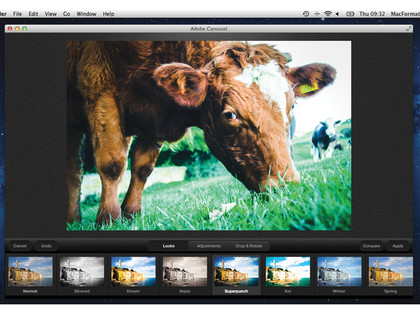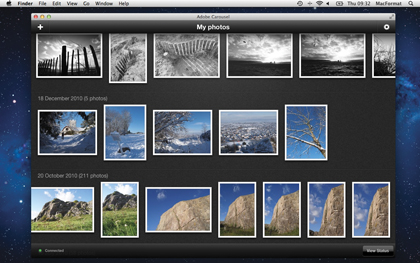TechRadar Verdict
Pros
- +
Easy to understand and use
- +
Straightforward sync process
- +
Consistent look and feel
Cons
- -
Monthly subscription charge
- -
Limited organising/editing tools
- -
iCloud is free
Why you can trust TechRadar
Adobe claims Carousel is the only tool that enables you to access your whole photo library from your Mac, iPhone or iPad, without storage issues or manual synchronisation.
The first thought on any Mac owner's mind, though, is going to be what Carousel does that iPhoto/iTunes/iCloud doesn't. And the second is why they should pay for photo synchronisation when they already get it for nothing.
Carousel is pretty similar to Apple's Photo Stream, which is part of the free iCloud service, but with a bit more control. Like Photo Stream, instead of copying photos across to your devices it stores them online. It then delivers files to your devices on demand, via your network connection.
There are no storage limits, and any changes you make, from creating Carousels to importing and editing photos, are automatically uploaded to the Carousel server.
You'll need an Adobe ID, which is free, but you pay a monthly subscription for Carousel, though there is a free 30-day trial. You download and install the Carousel client on your Mac and iOS devices, and you're ready to go.
Strips of film
Carousels are horizontally scrolling filmstrips of photos, and you can create a Carousel for a single set of photos or for shots taken over a longer period of time; in which case they're automatically split by date, so a single Carousel may consist of a series of these filmstrips that are arranged vertically. It's quick, simple and intuitive, and the consistency in appearance across the Mac and iOS versions is one of Carousel's strong points.
It's quite something to see photos you add on your Mac appear in moments on your iPad, but this does rely on the quality of your network connection. Carousel communicates with Adobe servers constantly, so you can't work offline.
Storage solutions

Adobe solves the problem of limited storage space on iOS devices by downloading only thumbnails and low-resolution proxies. It's only when you tap on a thumbnail to view the picture properly that it downloads a higher-res version.
So yes, Carousel does indeed make your whole photo library 'available', or at least all the photos you've imported into Carousel, even on a device with limited memory.
It also reacts to changes made on any device straight away. The downside is that it's heavily dependent on the quality of your network connection. Wi-Fi speeds are okay, but Carousel can be painfully slow over 3G which can go a long way to eating up your monthly allowance.
There are other limitations that gradually become apparent. This version will only import JPEGs, not TIFF, PSD or RAW files. You can carry out basic cropping, straightening and enhancement tasks and apply a range of nice but basic image effects. And it's all non-destructive, too, so you can rewind your changes if you make a mistake.
But for cataloguing and editing tasks in general, Carousel is too lightweight even to compete with iPhoto. Things begin to get redundant when you consider that you may end up running two photo collections, with your 'proper' one still on your Mac in iPhoto or Aperture.
Carousel shows promise in its current form. But its reliance on good network speeds, its monthly subscription charge and its very basic cataloguing and editing tools blunt its appeal considerably. We recommend you try before you buy.
Follow TechRadar Reviews on Twitter: http://twitter.com/techradarreview

Rod is an independent photographer and photography journalist with more than 30 years' experience. He's previously worked as Head of Testing for Future’s photography magazines, including Digital Camera, N-Photo, PhotoPlus, Professional Photography, Photography Week and Practical Photoshop, and as Reviews Editor on Digital Camera World.
